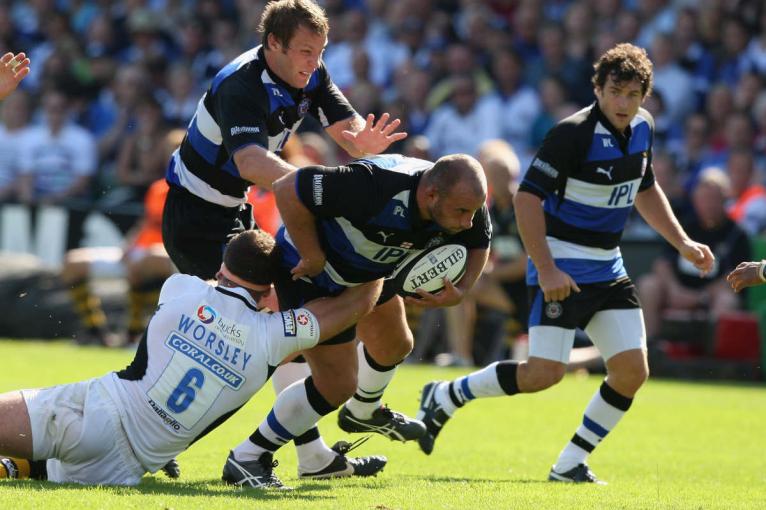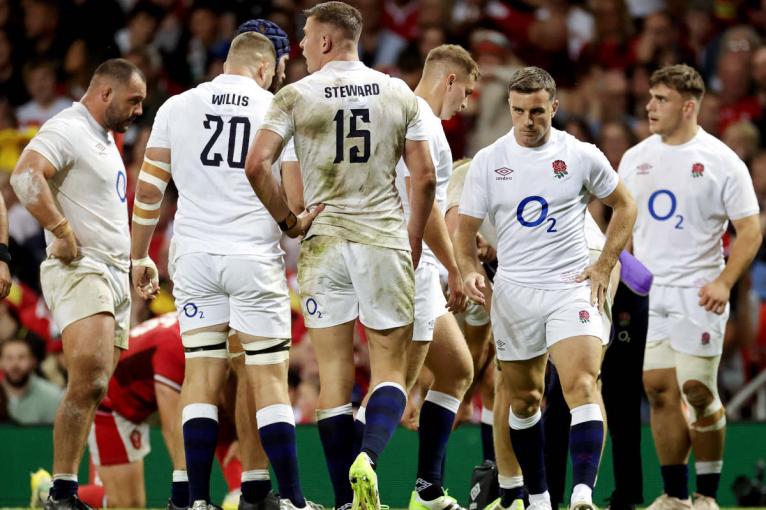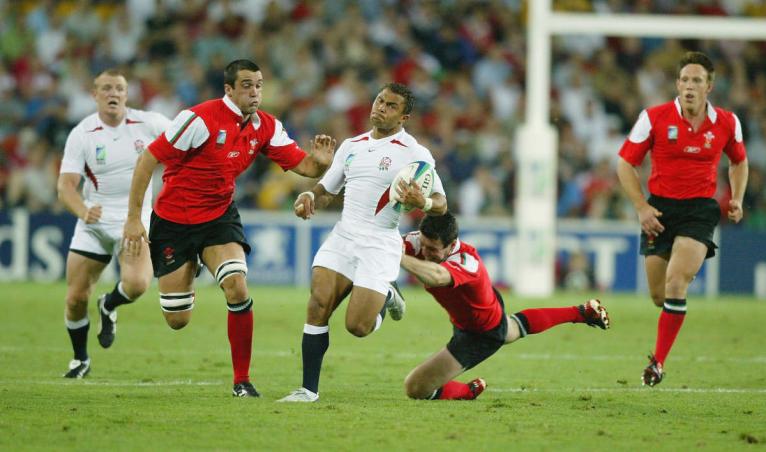It was the season after I’d stopped playing that I first sat back – in my new ergonomic chair – and zoomed out a little as I observed Bath, my now-former team, and how they were playing.
As a player in the, at-times, indecently narrow confines of the front row I saw my role to be, frankly, whatever the boss decided it should be. Hindsight can be punishing, and I now wish I’d backed myself to be more circumspect and occasionally outspoken around how we were being told to play, but the truth is that while I always felt I knew enough about the game and how to play it, I never truly believed I had the raw ability to put into action the crystal clear philosophies that lived between my ears. Best to be a good team player, then, and keep (relatively) quiet, leaving the gameplay chats to the fly-halves and anyone else who had the self-confidence to wear white boots.
As I looked on from the stands that season, something became entirely apparent: this was a side nowhere near making the most of the talent they had in that squad. Less than the sum of its parts, if you like. A fresh and experienced coaching team had been brought in, but the plan appeared to be rather narrow itself. One journalist soon described Bath as ‘Sarries-lite’ which, I can tell you, infuriated the Bath management. The theory behind this description was that Bath were trying to play the low-risk, high-pressure game that Saracens were close to perfecting, and which involved a lot of kicking but very little actual rugby played within 50 yards of their own try-line.
Except Bath didn’t have the players. They had runners. They had threats. They had Nick Abendanon, still, to my mind, a largely unappreciated genius, and he was shackled by a data-led plan that didn’t allow him – or his mates, who’d all been signed for their attacking prowess – to do what they did best, namely tear it up in unstructured play. Once Mike Ford took over and encouraged said players to rip defences apart and do it with a smile on their faces, Bath flew to a Premiership Final. They didn’t win it (Saracens did, of course), but goodness me it was tangible, satisfying progress.

I see something similar happening with England. It’s absolutely no surprise to see the Leicester Tigers-heavy coaching team decide to play in a similar fashion to that which won them a Premiership title. Actually, given the relatively short amount of time they had to prepare England for this World Cup (Wales, Australia, Argentina and Fiji are in pretty similar dinghies, it’s worth noting), it was probably the sensible, even logical approach to take. Keeping things simple and offering a group of – at the time – someone else’s players a clarity so distilled that it could remain clear even when heart rates were flying and ears were ringing didn’t seem like a bad plan. Yes, England – like every team in history – want to attack and score tries, but such ambition can, in the minds of those whose heads are on the proverbial block, feel inherently risky. And risky isn’t a nice feeling, especially when the world is watching.
England do not have enough players who clearly suit this plan, and therefore are currently nowhere near maximising their playing potential.
So the dreamy, scintillating attack is pushed down the list of priorities, because data tells us that other things are more important. First up is set-piece. Then defence. Then the all-important kicking game which, if well executed, relieves all pressure and loads it onto the opposition. Then, once we’re ‘down there’, we strike.
Only the problem with England following this plan is that they don’t have the players. This isn’t meant to sound as inflammatory as it does, so to qualify it, let’s say England do not have enough players who definitively suit this plan, and therefore are currently nowhere near maximising their playing potential.
England want to use their front five to pulverise opposing teams onto the back foot, which in turn would allow them to kick on their terms, to a retreating team. They also want to gain field position and points via penalties won at the scrum. They want to use their lineout to launch multi-faceted, bewitching plays that bamboozle defences. Inconveniently though, pretty much everyone else want this nirvana too.

The issue is that, while England have some truly exceptional players, this plan doesn’t necessarily suit them. Who cares what English rugby should look like? Who cares that England are supposed to have a huge, dominant forward pack? They currently don’t have one, so why try to play as if they do? If Jamie George stays fit, the lineout will take care of itself as he is a once-in-a-generation thrower of the ball. But as for the scrum, the power carrying game, the general bullying of opposition defenders, England currently do not have the raw power.
They do, though, have some tremendous, explosive athletes. Not many prop forwards carry and move like Ellis Genge. Maro Itoje, often mistaken for a behemoth in the Eben Etzebeth mould, has never been such. What peak Itoje offers is mind boggling fitness and energy, and real close quarter intelligence. To use him as a battering ram simply doesn’t work. The great Courtney Lawes is a sizeable unit who hits hard, but actually he is more effective when he takes the ball a bit further away from the breakdown, where there is room to use some of his underrated footwork before contact to make ground.
Imagine Jason Robinson being told not to run the ball back from his own half, especially not if it was raining.
Marcus Smith must be terrifying to play against in a fast-paced game, but stick him in a turgid one and guess what, he looks nothing like the player we watch in the Harlequins quarters.
Max Malins will always score tries, but rarely does he look as dangerous for England as he does for Saracens. Ditto the enviably talented Elliot Daly.
What happens, predictably, is that players are criticised for not transferring club form to the Test arena, and while that is sometimes the case, it isn’t always the answer. Wind the clock back a couple of decades to when England ruled the world. Imagine Jason Robinson being told not to run the ball back from his own half, especially not if it was raining. Imagine telling Neil Back – one of the best link players we have seen – not to stray so wide because that wasn’t where he belonged. Imagine telling Will Greenwood he couldn’t do exactly what he wanted whenever he wanted to do it. In sporting terms it’s unthinkable.

The notion of implementing a physically punishing, risk-averse, high-pressure plan at short notice had merit. What would qualify as unwise is to persist with such a plan when the players out there in the middle can’t make it work.
Is it time to give the laptops a rest? Ignore some of the supposed facts, remember what it was that actually made some of these players such distinguished professionals that they were and are deemed the best in the country, and let the boys play.
Perversely, cutting the team loose now appears the less risky option.



Flats. You are rapidly becoming a national treasure.
Spot on analysis.
Please send a copy to a certain S. Borthwick c/o RFU.
Immediately.
Reassuring to know, all those years we were screaming ourselves hoarse at the Rec “NO, run it, don’t kick it”, Flats was sat there thinking much the same thing.
A good coach plays to the strengths of his players, especially at international level where you cannot recruit players to fit your playing style. England's big problem is at the ruck. They recycle the ball too slowly, often by choice. When they do occasionally make a line break it often results in a turnover as players are too slow to the ruck or their clear out technique is not good enough. The old mantra about three quick rucks creating a broken defense generally rings true.
Curry has been a big miss, as fit and firing he is a complete back rower. I cannot understand why Mercer is not playing at 8. He is the reigning Top 14 player of the season. What is not to like? He has good hands, he is quick, another line out option, lots of involvements and his carrying is underrated.
As a team England are too slow. I want pace on the wings and at least one centre should offer a line break option.
There no longer seems to be anything that is really secure. . .We seem to be obsessed with every conceivable danger. . .Fear has become a basic characteristic of our entire culture.
Spot on. This England team don't scare anynody up front. They need to use the ball more.
Pinpoint accuracy in this article, England simply don't possess the behemoths that France, SA do, the England pack isn't going to dominate many teams physically over 80mins.
Our set piece is OK.
We don't have enough heavy ball carriers, so it would surely make sense to play a high tempo, fast & loose game that takes the emphasis away from bang, crash, wallop.
I fear that the England coaching team don't have the vision or coaching nous to recognise this fact.
Great piece! I totally agree with everything being said. England are trying to shoehorn players into a game plan rather than find a game plan that suits the players. I would like to see runners wider out, maybe off 10 rather than 9, making dents in the midfield then allowing us to play wider. Our first choice props are great in the loose and ok in the scrum, definitely showing we should play quicker and wider. We can only hope that come the world cup they are given license to cut loose.
This is exactly as I see it. As an outsider (Irish) , I can see that England have the talent but not the game plan. You have a rake of world class players who simply look lost. The best thing that could happen to England would be for someone to lock the coaching team in the closet and let Farrell and Ford get on with deciding what to do on the pitch.